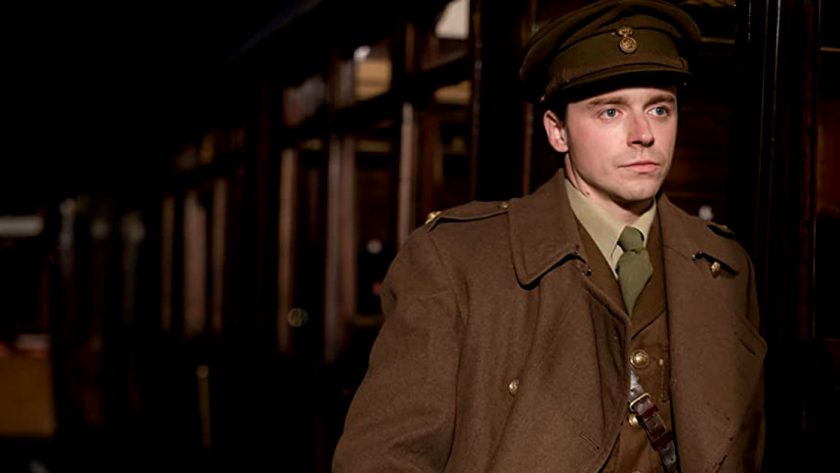BFI’s London Film Festival is in town! The FilmSoc Blog is back for the 65th edition of the city’s largest film festival, delivering a look at the hits and misses of the 2021-22 season.
Milo Garner reviews the biographical drama story of an English poet, writer and soldier, Siegfried Sassoon. Now premiering at the BFI London Film Festival!
In his Rite of Spring, Stravinsky sought new expression through ancient conception. His was a forward-moving backward-moving idiom. Primeval bloodletting as an entry into glowering musical declaration; here was the raw, unmoulded substance of the earth. Untrammelled, unkeepable. Benediction opens with that peremptory oboe, sounding below Sassoon’s poem on the piece. A serpent-conscious Eden, crude but pleasant. The curtain opens not to the unruly ballet but instead to modern war. This vision of ancient savagery brought up to bear with civilized cruelties; archival footage fills the stage, monochrome imagery of trench and sodden soldier. Sassoon, enthralled with Stravinsky’s embossment of barbarity, is then deployed to its embodiment. He and his brother enlist — a moving series of shots laps between faces, and railway, and brothers apart. A recapitulation of greyscale horrors. His brother would not return from war. Siegfried’s own initial fancy is soon diminished: by 1917 he is in open revolt against the high brass, only saved from court martial by the importune intervention of his many noble friends. His first gambit for resolution is dissolved, against his will. Davies now inserts a scene of Sassoon sat in church, the camera circling, until his young features grow old and haggard. Some forty years hence the face of Capaldi, mirthless, peers forward. He is here to repent: convert. The younger Sassoon would often mock the Church and her Bishops (doubtlessly Anglican, if it matters); the older now prostrates himself in crucifix shape in reverence to Catholic altar. There seems something pathetic, something incongruous about Sassoon’s late embracement of Roman catechism. He explains himself in nonspecific grandiosities: he is in search of something permanent, unchanging. One might doubt, yet further, his choice of Church.

This moment is for Sassoon the essence of his life. It is a decision that contradicts all we know about him, and most we will come to know. It is rather the sad residue of a life spent seeking. Always in search of the intangible what, every muse turned over, every expression given wings. Whatever it is Sassoon sought – in his admiration of Stravinsky, in his rebellion against the armed forces, in his poetic genius – is clearly left unfound. So that in aged misery he must seek that most sepulchral of solutions, to kneel before the great Papal throne, a hope that in tall-spired religion might some final comfort derive. Here one might end a film: here Davies all-but-begins. Every scene that follows takes its light in shadow of the cross; Davies has arranged for us first a man forced to capitulate to higher power, and then a man who makes capitulation his business. It is not a triumph of faith, but rather a despairing shuffle upon the one untravelled road. His attempts at love, at domesticity, all of each flounder the same. There is a welt upon Sassoon that cannot be so easily cured: that leaves him a shadow life, as much pursuing one absolute as pursued by another. In 1917 he writes:
Time makes me a soldier; but I know
That had I lived six hundred years ago,
I might have tried to build within my heart
A church like this, where I could dwell apart,
With chanting peace; my spirit longs for prayer,
And, lost to God, I seek him everywhere.
It appears, in later life, Sassoon has finally conceded the church of the heart, and made amends with that of stone and mortar. God sought in that last possible refuge. A 1919 poem is perhaps more revelatory: And the haunted gap in your mind has filled with thoughts that flow/Like clouds in the lit heaven of life. A haunted gap that Sassoon is ever-filling.
Davies arranges his film with pendulous motion: he does not require chronology, nor seek a neat narrative direction. He will stipple the olden Sassoon in with the new, in order that we might see all great aspirations unmade, all fine ambitions left in ruin. Sassoon’s first and greatest flaw is a weakness for beauty, a vice one would think endemic to poets. Often an ugly beauty nonetheless: the ghastly tycoon Ivor Novello first encumbers the war-worn poet, a mendacious purveyor of musical theatre (are any of us surprised?) who glories in the shadow-world of quietly-permissible same-sex relations. A later scene remarks more decidedly on what is, doubtless, an autobiographical upset at the peculiar rhythm of then (and perhaps now) gay culture. Whereby the secrecy and prohibition surrounding homosexuality essentially enabled and encouraged a milieu of infidelity and inveterate dishonesty: because to whom could one appeal? Under what symbol or sacrament could two men be joined in permanence or less? There was no such architecture; a certain looseness and insolvency is inherent in every joining. An enormous palace liable to collapse inward at the slightest sneeze. The result being a transience and a distended yearning; this carousel of beauties that by its nature multiplies pain. Sassoon is himself equally subject to the laxness of illegality: he casts off the warm-natured Glen Byam Shaw for the heinously gauche Stephen Tennant in sole pursuit of beauty. A beauty that mangles his mind. Sassoon, as was often of the time, would later marry a woman of kind standing in order to escape this emotional bloodbath: Davies is quick to unspin even this fanciful venture. We witness Tennant morph into his old, unbeautiful future (his hands still attractive, he is quick to chance), and see Hester Sassoon also. Young, and fresh, and so naïve — sunk into old misery. Sassoon’s rashness and ill-minded fancy have not redeemed his life — as he first hopes his wife would, and then his son — but rather sunk the ship completely. Tennant seeks forgiveness and is rejected; Sassoon has kept the agony of that breakup hot and spitting. Here is a film that knows how to slump.
If these late scenes resemble a crippled elephant, recumbent and reflective, the midst of the film is a deal more jaunty. Davies is sharp and furbished in wit and raillery: his characters dart at one another with almost ceaseless quips. The poetry that features in the film — recited gravely by Jack Lowden, over footage of World War brutality — is typically that of Sassoon’s more despairing account. Those moving descriptions of pitiless war and fallen friends. This is not entirely representative of the poet in a more general survey: much of his poetry is biting and satiric, a travesty of the war as much as lachrymose memorial. It is ironic that one of Sassoon’s more introspective poems is then mustered in parodic carriage: ‘When I’m Among a Blaze of Lights’ speaks of Sassoon’s dislike of parties, and his longing for the close comforts of home. To have Sassoon recite this poem while at a party naturally swivels its effect somewhat. The same party bears the marks of another of his poems, the last stanza of ‘Dead Musicians’. Sassoon writes (italics his): I think of ragtime; a bit of ragtime/And see their faces crowding round/To the sound of the syncopated beat. He talks of his fellow soldiers, whose faces he cannot see in the towering symphonies of Beethoven, or the mechanisms of Bach. In the film, his host deprecates ragtime as hardly music at all – one might intuit the simmering disdain Sassoon feels for these bloated, caricatured Edwardians. Even Novello is at one point blunted by Sassoon’s wartime bludgeon: while he toured theatres in the sticks, Sassoon faced the Somme.

But in the main Sassoon is very much involved in this coterie of ridiculous artists and socialites; he gives as he gets. Between many lovers, between many balls and parties and poetry recitals, Davies achieves two things. First he summons in full authenticity a post-Edwardian revelry. It is rare to see a film so completely in its time, swarming with the language and the opinions of its origin. The Wagnerians out against the Impressionists: one feels occasionally in the midst of Proust, alighting at one of his dinner parties and overhearing all the usual conversation. Second, and most integral, he saps his film of its undercarriage. This middle-passage is the most superficial and least meaningful in the film; this is not a failure, but rather itself the substance. If ever we might wonder the cause of Sassoon’s clear obliteration of personality, we might here reference what were his glory days. Endless nattering, endless affairs, endless eccentrics and their endless opinions. It is grossly entertaining but entirely hollow. A life held up on stilts. Genuine romance among men seemed, for reasons of taste and society, an impossibility. Romance with woman a sordid lie, a mutually destructive trick. It is not to this time that the old Sassoon will remember in wistful desire. If the war would haunt him for his closing days — we see war-footage superimposed behind the aged Sassoon, as he sits battle-free in his garden — this is a haunting made emphatic by particular loss.
Perhaps the finest sequence of the film is that set in the Craiglockhart War Hospital, in which a bristling Sassoon meets the young and pleasant-faced Wilfred Owen. They make immediate kinship. Sassoon reads Owen’s ‘Disabled’ in silent awe — the content of this poem kept from the audience until final scene. Perhaps Sassoon is so bewildered by the poem by means of comparison: where Owen exudes a kindly, earnest sympathy for those mangled and dismembered by warfare, Sassoon’s poems on the same subject are generally of a more satirical, sharp-hewed bent. He will write of ‘The One-Legged Man’: He hobbled blithely through the garden gate,/And thought: “Thank God they had to amputate!” — a withering account of a war in which a man would rather live in crippled peace than healthy conflict. In Owen, Sassoon sees that which he is not, or that which he does not completely express. The gentle, the insecure. Their romance, or not-quite, needs only a few tender scenes to explicate. Dancing, cheek-on-cheek; passing, ever so lithely, while swimming in the pool; spending just those extra seconds before saying farewell. Owen did not survive the war; a later scene will have the old Sassoon, peering outside a rain-sodden window, remember the many faces of his past. It is on Wilfred he lingers most longingly, on that war-ruined romance that his life now hinges. The final sequence of the film, which will situate old Sassoon on a bench before dissolving to the young, will at last fulfil the silence — hushed is the house that once was full of songs — that accompanied Siegfried’s first reading of his Wilfred’s poem. He spots an amputee taking in the air, and the gracious lines of Owen come alight. These words redound not only in their literal aspect, but in the greater sense: of men changed (Sassoon would make this gag, in the reverse order, in “They”), of permanent wounds that have made familiar home a strange place; the war will not be done.
In 1915, a Siegfried Sassoon perhaps more naïve penned the lines: Horror of wounds and anger at the foe,/And loss of things desired; all these must pass. So he supposes then, still in fragrant youth, years yet from the war’s final cadence. The line that ends the stanza is more nerving and more beautiful: Time’s but a golden wind that shakes the grass. This same time that ticks blank and busy on soldiers’ wrists, this same time that, in drone of traffic, drifts down the street. For as much as Benediction is a fractured account of a man seeking to forget and seeking for indulgence (of either kind), it is a film about passage. Old memories turning to ruin; faces falling slack; music finding new shapes and sounds. Sassoon, as all men, cannot escape his compound of remembrance past. He is surrounded by patient, stupid, sullen ghosts of men; his dreams drip with murder. Davies finds in Sassoon a measure of kindred spirit — just as he did with Dickinson, no matter how inverse these poets might seem. Benediction is, in its constituency, an enormous prospect: it is composed of so many building chords, an antilinear fantasia that finds within it all the great regrets and miseries of jagged pasts growing old. In form it is bracing: in seeing such a film as this I become convinced that so few filmmakers have a true understanding of cinema as an art. Davies works in sound, he works in montage, he works in faces. I could write longueurs on Benediction’s flaws — on beleaguered scenes or spotty lighting — but to do so would be redundant. There are many films more perfect. But perfection is not the object. Davies seeks a quality that far supersedes it.
Benediction out right now:




